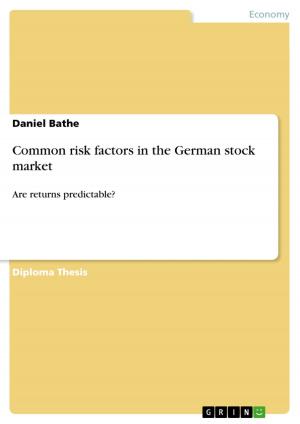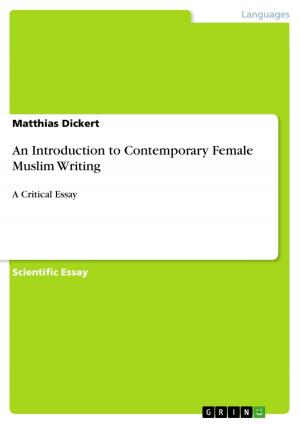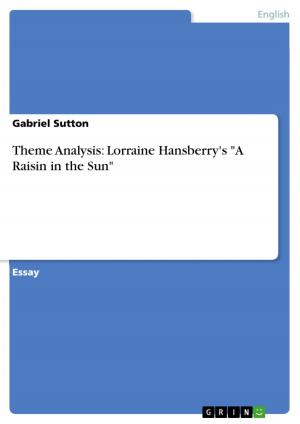Aspects of Good and Evil in 'Harry Potter - The Prisoner of Azkaban'
The Prisoner of Azkaban'
Fiction & Literature, Literary Theory & Criticism, British| Author: | Andreas Kellner | ISBN: | 9783638265355 |
| Publisher: | GRIN Publishing | Publication: | April 3, 2004 |
| Imprint: | GRIN Publishing | Language: | English |
| Author: | Andreas Kellner |
| ISBN: | 9783638265355 |
| Publisher: | GRIN Publishing |
| Publication: | April 3, 2004 |
| Imprint: | GRIN Publishing |
| Language: | English |
Seminar paper from the year 2002 in the subject English Language and Literature Studies - Literature, grade: good minus, University of Münster (English Seminar), language: English, abstract: In novels and fictional stories we often meet good and evil characters, characters which fight each other. This fight between good and evil makes the story really interesting and exciting because it hurries the action along. But often the reader is not able to say which character really belongs to the good or the evil ones. It is the ambiguity of the characters and their changes during the story that grip the readers. This paper will have a look at one exemplary character and try to solve the question whether it is good or evil. Besides, the thesis that animals and creatures in The Prisoner of Azkaban cannot be categorized as clearly as the main characters will be dealt with. In this way different aspects of the terms 'good' and 'evil' shall be demonstrated. 'Good' and 'evil' represent a pair of opposites that is part of many stories and of our whole life. Actions which are against virtues and values, which are reprehensible and damnable, are generally seen as evil. Pleasure in destroying, in lying, in betraying and in being cruel, in neglecting the rights of human beings, these aspects are declared to be evil.1 They belong to actions and their consequences which are caused by human beings, for example torturing innocent people in a war. Due to St. Augustine, these are moral evils or deficiencies of man's will. He thinks of the moral evil as the true evil because human beings have free will and the choice to do good or evil. So it is their choice to commit evil actions or not.2 [...] 1 See Rudolf Eisler, ed. Wörterbuch der philosophischen Begriffe 1, 4th ed. (Berlin: Mittler und Sohn, 1927), p. 227. 2 See Ester S. Buchholz and Joshua K. Mandel, 'Reaching for Virtue, Stumbling on Sin: Concepts of Good and Evil in a Postmodern Era.', Journal of Religion and Health 39.2, (2000): p. 130.
Seminar paper from the year 2002 in the subject English Language and Literature Studies - Literature, grade: good minus, University of Münster (English Seminar), language: English, abstract: In novels and fictional stories we often meet good and evil characters, characters which fight each other. This fight between good and evil makes the story really interesting and exciting because it hurries the action along. But often the reader is not able to say which character really belongs to the good or the evil ones. It is the ambiguity of the characters and their changes during the story that grip the readers. This paper will have a look at one exemplary character and try to solve the question whether it is good or evil. Besides, the thesis that animals and creatures in The Prisoner of Azkaban cannot be categorized as clearly as the main characters will be dealt with. In this way different aspects of the terms 'good' and 'evil' shall be demonstrated. 'Good' and 'evil' represent a pair of opposites that is part of many stories and of our whole life. Actions which are against virtues and values, which are reprehensible and damnable, are generally seen as evil. Pleasure in destroying, in lying, in betraying and in being cruel, in neglecting the rights of human beings, these aspects are declared to be evil.1 They belong to actions and their consequences which are caused by human beings, for example torturing innocent people in a war. Due to St. Augustine, these are moral evils or deficiencies of man's will. He thinks of the moral evil as the true evil because human beings have free will and the choice to do good or evil. So it is their choice to commit evil actions or not.2 [...] 1 See Rudolf Eisler, ed. Wörterbuch der philosophischen Begriffe 1, 4th ed. (Berlin: Mittler und Sohn, 1927), p. 227. 2 See Ester S. Buchholz and Joshua K. Mandel, 'Reaching for Virtue, Stumbling on Sin: Concepts of Good and Evil in a Postmodern Era.', Journal of Religion and Health 39.2, (2000): p. 130.















